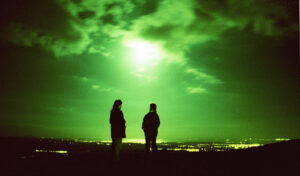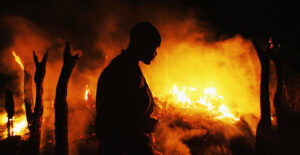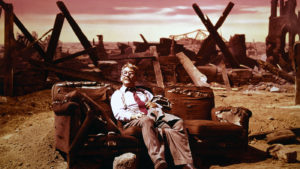Readers, friends, sea cucumbers, square roots of negative one! A momentous anniversary will soon be upon us! Next year, 2025, will mark the 80th anniversary of the day a car rolled into my hometown of Reno, Nevada, in the strange calm of the summer just after the end of the Second World War. It was carrying a man and a woman, in frenetic search of one of Reno’s many no-questions-asked, all-purpose marriage-and-divorce chapels.
The woman was Elisa Bindhoff, an artist and writer from Chile, whom the man had met not long before in New York. The two had come to take advantage of Nevada’s famously flexible approach to matrimony, in the hope of breaking with their pasts, to the extent that this is possible for any being with a memory and a conscience, and to start over again, together. Newly wed, the pair next took off for a nearby Hopi reservation, carrying a volume of the works of utopian socialist Charles Fourier.
I have sometimes wondered whether André Breton’s unlikely visit to Reno did not play a role in shaping my own sensibilities, given I was born just around the corner from the chapel in 1972. Perhaps the man had inadvertently shed there some animula or inferior soul, which then spent the next 27 years migrating through the HVAC systems of our town’s many casinos and breakfast smorgies, until the appointed hour arrived and it made its way into this fresh babe’s body to begin again.
I am not saying I am the reincarnation of the founder of Surrealism. Not exactly. But I do discern from his Nevada sojourn, more than from the nearby atomic tests of the following years, a certain change in the air of the place that must be taken into account when explaining the strange mutations still occurring in births there a generation later — whereby the European avant-garde contributed its venerable cachet to the new varieties of West Coast freakdom that I myself was raised on. Anyhow, stranger things have happened. Stranger things are always happening. Existence itself is vastly stranger in fact than any scenario of transmigration we might conjure in our imaginations. And it is only by full, free, audacious use of the imagination that we may hope to come to an adequate comprehension of existence. This is what we might call the philosophy of Surrealism.
This year marks an even more important anniversary than the one I am already anticipating for 2025: the centenary of Breton’s epoch-making Manifesto of Surrealism. On a certain reading, this work is but the cri de coeur of a spirited young man with bold opinions of his contemporaries’ talents, and a very high estimation of his own. More charitably, it is a resounding defence of human freedom, and of the role of an unfettered, autonomous imagination in freedom’s exercise. “The mere word ‘freedom’ is the only one that still excites me,” Breton writes in the manifesto. No matter how oppressive our social arrangements might become, there is for him no arrangement that can fully stifle freedom of thought, whose ultimate expression comes through in the faculty of the imagination. This faculty, he writes, “alone offers me some intimation of what can be”.
Imagination pullulates beneath the surface at every moment of our waking lives, yet it is only in states of altered consciousness, most notably in madness and dreams, that we may hope to have the clearest vision of “what can be”. (Breton does not have all that much to say about drugs, an interesting absence at the dawn of the age of mescalin.)
“I have always been amazed,” he reflects, “at the way an ordinary observer lends so much more credence and attaches so much more importance to waking events than to those occurring in dreams.” He anticipates a future in which the opposition between dream and reality is resolved “into a kind of absolute reality, a surreality, if one may so speak”. He laments the absence of attention to the dream-life in modern philosophy, wondering suggestively: “When will we have sleeping logicians, sleeping philosophers?”
As for madness, Breton concedes that it is not exactly conducive to the discovery of truth, as the insane are, to some extent, “victims of their imagination”. In their case this faculty “induces them not to pay attention to certain rules — outside of which the species feels itself threatened — which we are all supposed to know and respect”. This indifference can indeed get them into trouble, and yet, Breton insists, the resolute indifference of the insane to the judgments and even the punishments doled out to them by society “allows us to suppose that they derive a great deal of comfort and consolation from their imagination”.
Already we are seeing that for Breton Surrealism is more than just a celebration of harmless reverie, but rather a bold defiance of the modern aspiration to a full rational ordering of human life and of human society. This aspiration had taken root already in early modern Europe with the emergence of rationalist philosophy, only to become hegemonic by the end of the 19th century in the institutions of science, and in the technocracy developed to manage science’s ever-accelerating progress.
But in truth France can institutionalise just about anything. One season’s ultimate transgression — Georges Bataille, say, effusing about the “solar anus” — becomes the next season’s stuffy and convention-bound academic conference. And so, too, with Breton. By the Fifties, Surrealism will have won over at least one prominent academic defender in Ferdinand Alquié, professor of philosophy at the Sorbonne, who in 1955 published a curious study entitled Philosophie du surréalisme.
Here Alquié argues that Surrealism ought to count as philosophy in the fullest sense, to the extent that it aims at liberation through self-knowledge. And in this respect, Alquié contends, Breton is in his way a legitimate heir to the tradition of his countryman René Descartes. Alquié himself had been a devoted Cartesian since childhood, convinced of the soundness and validity of the so-called Cogito argument, in which his predecessor establishes the certainty of his own existence as an immaterial thinking subject. His life-long project was to demonstrate what he took to be a significant harmony between Cartesianism and Surrealism. “There are,” Alquié insists, “points of contact between the thought of Breton and that of Descartes.” It is with respect to dreams that Alquié believes this harmony can be discerned most clearly. “Descartes is the only philosopher,” he explains, “who held that dreaming and waking are, in a number of cases, indistinguishable.”
I think Alquié quite exaggerates the prospects for reconciliation here. For Descartes wrote about dreams only because he was worried about the possibility of mistaking them for reality, or of mistaking reality for a dream. He focused on the similarity between waking and dreaming only because he found it so urgent to identify and isolate the key markers by which we might reassure ourselves that we are not dreaming. From there he sought to cordon off and isolate the dream-life, minimising the threat it poses to the proper use of our faculty of reason.
More generally, in Cartesian rationalism the imagination, far from being the highest expression of our freedom as it will later be for Breton, is seen mostly as a degraded mental faculty, a crutch relied on by finite minds such as ours. When God, conceived by Descartes as a divine geometer, thinks about triangles, he does not form a mental image to help him comprehend their essence. He simply cuts right to the chase and contemplates the rational properties of triangles as revealed in geometrical proof. For Breton, by contrast, human imagination has an almost demiurgic power. Poetry returns for him to its most primordial sense, as poïesis, the activity of the human mind that brings us closest to the world-making omnipotence of the Creator.
Our creative potential, however, is best realised when creation occurs less in a manner analogous to an architect building an edifice, and more as a sort of hypostasis, as in a cup so full it cannot help but spill over. Yet however things may appear, our creative outpourings are never just n’importe quoi, never simply whatever happens to come out. Rather, the productions of the imagination are governed, Breton thinks, by a certain automatism, which he describes as “a monologue spoken as rapidly as possible without any intervention on the part of the critical faculties,” and thus as “akin to spoken thought”. It is in fact in terms of automatism that Breton proposes to define Surrealism “once and for all”:
SURREALISM, n. Psychic automatism in its pure state, by which one proposes to express — verbally, by means of the written word, or in any other manner — the actual functioning of thought.
This dimension of Surrealism is perhaps most familiar from the practice of so-called “automatic writing”. This technique has a long history, and by the 19th century it was most familiar in the context of séances, where a channeler might claim to be taking dictation from a summoned spirit. A popular product of this pastime is the Ouija board, patented in 1891 and sold to Parker Brothers in 1966.
With his Cartesianism, Alquié had hoped to resist French philosophy’s overwhelming fondness, then as today, for Baruch Spinoza. But this hope compelled him to deform Descartes almost beyond recognition in order to make him fit with his other great hero, André Breton. He would have done better, perhaps, in search of such a fit, to turn to yet another of the great early modern rationalists, G. W. Leibniz, who might be seen as having anticipated Surrealism with his own idea of spiritual automatism.
As scholars such as Christopher B. Noble have recognised, Leibniz was a very special sort of mechanical philosopher. He believed, like Descartes, that all bodies are governed entirely by mechanical laws, while no internal soul-like principle of motion and activity is needed in order exhaustively to account for bodily motion in physical terms. However, he also believed that souls, like bodies, are themselves “automatic”, in that all of their successive states unfold entirely from the sum-total of their previous states, which Leibniz sometimes calls their “complete concept”. Any individual’s complete concept will remain mostly unknown to the individual, perceived only “confusedly”, as he himself would say, or perhaps “unconsciously”, to speak in the common language of the early 20th century that Breton, as well as Sigmund Freud, prefers.
Automatism is a strange notion. It is the Greek-rooted term that is typically rendered into Latinate languages as “spontaneity”. But what is “spontaneous” is generally seen not as determined by anything prior, but rather as emerging “just because”, from the groundless and arbitrary will of a free agent, or from an objectively random process such as radioactive decay.
These considerations may shine more light on the philosophy of Surrealism than is at first apparent. The Surrealists have sometimes been criticised, notably by their contemporaries in the OuLiPo movement, for “just saying whatever”, for letting verbiage spill out of them with no sense or order. The OuLiPians were hesitant to admit that such exercises might have interesting results, preferring instead to impose external formal constraints on their own writing — for example, eliminating the letter e, or eliminating all vowels but e —, while denying that their own unconscious minds had any role in what came out of these experiments. For OuLiPo, the machine or “automaton” of writing worked best when imposed from outside; for the Surrealists, it was the internal workings of the human imagination, fuelled by half-forgotten dreams and other subconscious burblings, that made the work come out the way it did.
But the OuLiPians were wrong to suppose that their preferred constraint was any more disciplined or structured than that of the Surrealists. The Surrealists could not tell you in advance what form their texts would take, but this does not mean that the texts were themselves formless. The form they traced, in fact, was nothing less than that of human interiority itself. And the freedom enjoyed in such a tracing exercise was not freedom to the extent that one could simply do as one wished. It was rather freedom in a distinctly Leibnizian sense, where what unfolds from the mind does so only in consequence of the nature of that mind, rather than by any “extrinsic denominations”, as Leibniz called them, almost as if he were himself describing the OuLiPian love of explicit rules.
André Breton was a true revolutionary, who already in the early Thirties found himself at sharp odds with the French Communist Party. In the Fifties, when others of the Surrealist founders, notably Paul Éluard, were still writing fawning poems for Stalin, Breton gravitated towards the Fédération Anarchiste. What he seems to have hated most is not any particular political order, from the very short list of orders we have to choose from in the modern period, but rather the metaphysics that underlies American-style capitalism and Soviet communism alike: a flat-footed realism that stupidly and incuriously denies the strangeness of our existence by deferring to the authority of science. “I loathe [the realistic attitude],” he writes in the 1924 manifesto, “for it is made up of mediocrity, hate, and dull conceit.”
I used to wonder why it is only towards the end of the 19th century that we start to see anything like an intellectual and artistic avant-garde, bubbling up in the 1890s with the ‘Pataphysics of Alfred Jarry, and roaring into full cultural ascendancy in the Twenties, not least with the appearance of the Surrealists. But the explanation is in fact very simple. It was only towards the end of the 19th century that scientific rationalism had fully evolved, from an epistemic stance of individual curiosity, into a technocratic regime that shaped and limited what happens in society as a whole no less than in the laboratory or the workshop. Surrealism could only arise when it did because it was only then, or just before then, that stubborn, proud, ignorant realism had triumphed so fully as an ideological mechanism for circumscribing human freedom.
Which brings me back to the high desert of Nevada, a state known not only for its atomic tests and its pioneering innovations in the field of no-fault divorce, but also for a certain neoprimitivist fantasy festival, of which you may have heard, which takes place each year under the name of “Burning Man”. This is not just spillover from the New Age-inflected tech culture of California, as many believe. It is rather something autochthonous to the American West more generally, another sort of world-historical Spirit that already hung over the place from my earliest childhood, and that compelled those of my Western American kind to revere any and every cultural artefact that could be characterised as “weird”. Long before I was mature enough to articulate any coherent idea at all of why I liked what I liked, I knew exactly what I wanted every time I approached a record store or bookstore or novelty t-shirt shop: I wanted the weirdest shit money could buy.
Where did this cult of the weird come from? Why was it so easy to take it for granted? We have often imagined it to be a mostly post-war phenomenon, and to have reached its most effervescent peak not long after LSD hit the streets of American cities in early 1965. But there is a more longue-durée history that might plausibly identify this mostly American chapter of the history of weirdness as a relatively faint after-echo of ideas articulated in the Old World already a century ago. Among these, André Breton’s belief that the dream-life is no less important to human existence than the world we confront upon awakening, and that the “realism” that would deny this is nothing more than the mediocre and hateful ideology of modernity trying to pass itself off as self-evident, is surely among the most powerful.
Disclaimer
Some of the posts we share are controversial and we do not necessarily agree with them in the whole extend. Sometimes we agree with the content or part of it but we do not agree with the narration or language. Nevertheless we find them somehow interesting, valuable and/or informative or we share them, because we strongly believe in freedom of speech, free press and journalism. We strongly encourage you to have a critical approach to all the content, do your own research and analysis to build your own opinion.
We would be glad to have your feedback.
Source: UnHerd Read the original article here: https://unherd.com/




